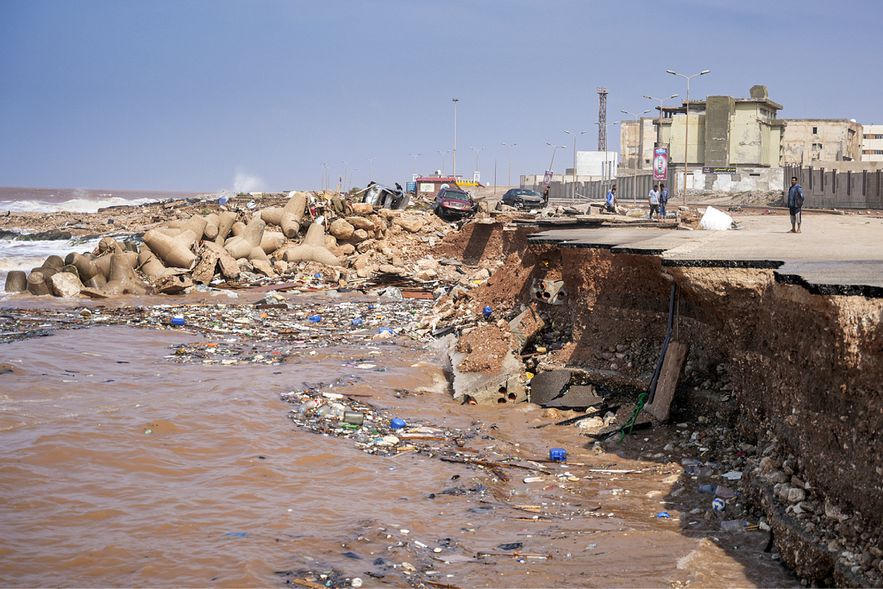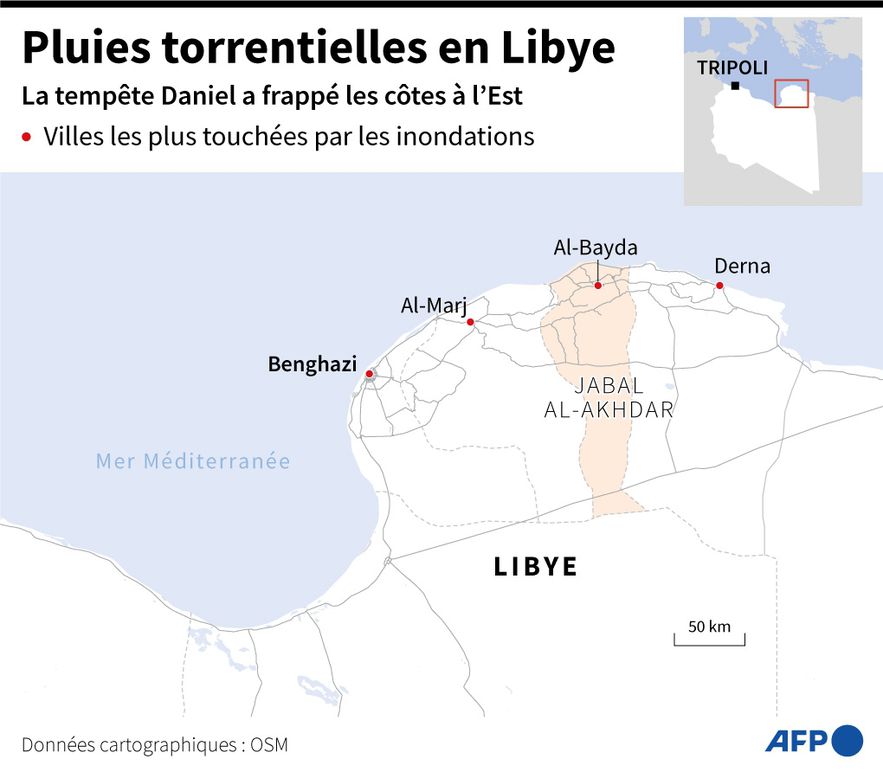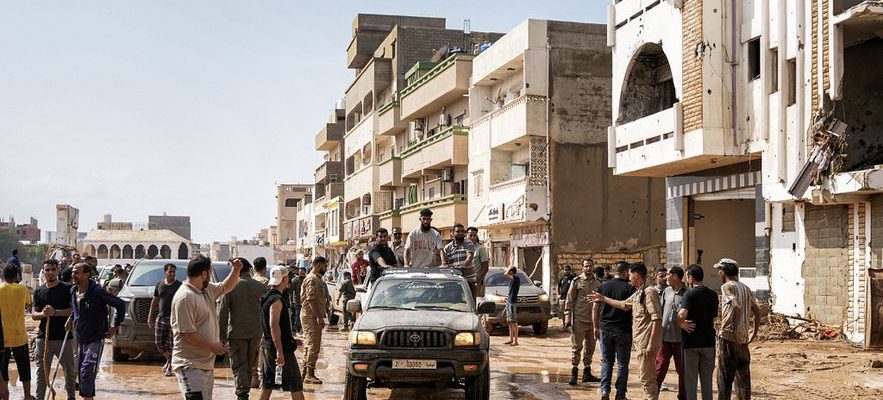Several NGOs are worried. Torrential rains and floods in Libya, hit in turn by storm Daniel, have caused an “enormous” number of deaths which could be counted in the thousands, said this Tuesday, September 12, an official from the International Federation of Societies. of the Red Cross and Red Crescent (IFRC).
The results remain uncertain, said Tamer Ramadan, during the regular UN press briefing in Geneva. “We do not have final figures” for the moment, he said, stressing that “the number of missing is close to 10,000”.
A fluctuating balance sheet
Photo provided by the office of Libya’s interim prime minister, based in Benghazi, on September 11, 2023, of a flooded area in Derna, in the east of the country
© / afp.com/-
It is difficult to know at the moment the exact extent of the disaster. An initial report shows at least 150 deaths in Libya, according to an official source. Speaking on the Almasar channel, the head of the executive in eastern Libya, Osama Hamad, put forward the figures of “more than 2,000 dead and thousands missing” in the city of Derna alone, but none No medical source or emergency services have confirmed this report.
If the eastern Libyan media widely reported Osama Hamad’s statements, the separate reports they reported from different localities were much lower than the figures he put forward.
“At least 150 people were killed due to flooding caused by storm Daniel in Derna, the Jabal Al-Akhdar regions and the suburbs of Al-Marj,” Mohamed Massoud, gatekeeper, previously told AFP. – speech of the head of the eastern executive.
A curfew has been declared in Benghazi
Described by experts as an “extreme phenomenon in terms of the quantity of water that fell”, storm Daniel has already caused at least 27 deaths in recent days in Greece, Turkey and Bulgaria.
Daniel hit eastern Libya on Sunday afternoon, notably the coastal towns of Jabal al-Akhdar (north-east) but also Benghazi where a curfew was declared and schools closed.
The east of the country is home to the main oil fields and terminals. The National Oil Company (NOC) has declared a “state of maximum alert” and “suspended flights” between production sites where activity has been drastically reduced.

Photo provided by the office of Libya’s interim prime minister, based in Benghazi, on September 11, 2023, of a collapsed road after torrential rains in Derna, in the east of the country
© / afp.com/-
The ravaged town of Derna
Rescue teams were dispatched on Sunday to Derna, a town located 900 km east of Tripoli and 300 km east of Benghazi that was partially destroyed during violent clashes in 2018 between the forces of Marshal Khalifa Haftar, strongman from eastern Libya, and radical Islamist groups who controlled the city.

Torrential rains in eastern Libya
© / afp.com/Sophie RAMIS, Sylvie HUSSON
With a population of more than 100,000 inhabitants, the coastal town is crossed by a wadi which flows into the Mediterranean and which overflowed due to the storm for around fifty meters on each side, carrying away buildings and houses in its path, according to videos broadcast by the media.
Earlier Monday, before going there with his ministers, Osama Hamad declared Derna a “disaster city”. Hundreds of residents are still stranded there in hard-to-reach areas while rescue teams, backed by the army, are trying to come to their aid.
Authorities in eastern Libya “lost contact with nine soldiers during rescue operations in this town”, according to Mohamed Massoud.
Footage shot by residents of eastern cities like Derna, al-Bayda and smaller towns shows massive mudslides and entire neighborhoods under water, as well as collapsed roads and buildings. A Derna municipal council official described the situation in his town as “catastrophic”, “out of control” and requiring “national and international intervention”, in statements to local channel Libya al-Ahrar.
On Monday, Presidential Council (PC) head Mohamad al-Manfi called for “help from brotherly and friendly countries and international organizations” and officially declared the eastern towns of Derna, Shahat and al-Bayda Libya a “disaster zone”, according to a statement on Facebook. He reported the collapse of four main bridges and two buildings as well as the city’s two dams.
National mourning
Endowed with the most abundant oil reserves in Africa, Libya has been plunged into chaos since the fall of the regime of Muammar Gaddafi in 2011 and rocked by divisions and violence. For a year and a half, two governments have been competing for power there: that of Abdelhamid Dbeibah in the West, recognized by the UN, and that appointed by Parliament and supported by Marshal Haftar.
During an extraordinary council of ministers broadcast live on television on Monday, Abdelhamid Dbeibah announced “three days of national mourning”, emphasizing “the unity of all Libyans” in the face of this catastrophe.
The UN mission in Libya said it was “closely monitoring the emergency situation”, and French President Emmanuel Macron expressed his “solidarity with the Libyan people”. US State Department spokesman Matthew Miller also expressed his “sympathy and condolences” and said Washington was working with the United Nations and Libyan authorities to help with relief efforts.
